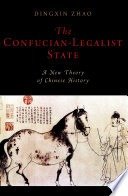
The Confucian-legalist state: a new theory of Chinese history
In The Confucian-Legalist State, Dingxin Zhao offers a radically new analysis of Chinese imperial history from the eleventh century BCE to the fall of the Qing dynasty. This study first uncovers the factors that explain how, and why, China developed into a bureaucratic empire under the Qin dynasty in 221 BCE. It then examines the political system that crystallized during the Western Han dynasty, a system that drew on China's philosophical traditions of Confucianism and Legalism. Despite great changes in China's demography, religion, technology, and socioeconomic structures, this Confucian-Legalist political system survived for over two millennia. Yet, it was precisely because of the system's resilience that China, for better or worse, did not develop industrial capitalism as Western Europe did, notwithstanding China's economic prosperity and technological sophistication beginning with the Northern Song dynasty.
Oxford University Press
New York
